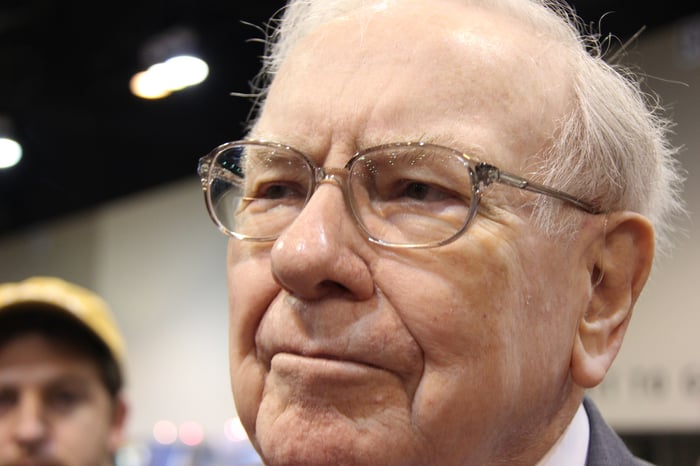For nearly six decades, Berkshire Hathaway (BRK.A 0.70%) (BRK.B 0.93%) CEO Warren Buffett has put on a clinic for Wall Street and the investing community. Since taking the helm at Berkshire in 1965, he's created more than $610 billion in value for shareholders (himself included), and delivered an aggregate return of 3,641,613% for the company's Class A shares (BRK.A), as of Dec. 31, 2021.
Because of the Oracle of Omaha's incredible track record, Wall Street and investors closely monitor every stock his company buys and sells. This is relatively easy to do given that Berkshire Hathaway is required to file Form 13F with the Securities and Exchange Commission once per quarter. A 13F provides an under-the-hood look at what the smartest and most successful investors have been buying and selling in the most recent quarter.

Berkshire Hathaway CEO Warren Buffett. Image source: The Motley Fool.
But what you might not realize is that Buffett and his company have a secret portfolio with $6.3 billion in assets under management. You won't find these holdings listed in a Berkshire Hathaway 13F filing.
In June 1998, Berkshire Hathaway acquired insurance company General Re for $22 billion. One of the operating segments Buffett's company came to possess with this buyout is specialized investment services firm New England Asset Management (NEAM). Although Buffett isn't in charge of New England Asset Management's $6.31 billion in assets under management, these assets are, ultimately, owned by Berkshire Hathaway.
Interestingly, even though this secret Buffett portfolio contains more than 160 separate holdings, 86% of invested assets are tied up in only three stocks.
Apple: 56.6% of invested assets
New England Asset Management's largest holding, Apple (AAPL -1.20%), also happens to be the biggest holding of Berkshire Hathaway. But whereas Apple accounted for 39.4% of Berkshire's invested assets, as of this past weekend, it comprised an even beefier 56.6% of NEAM's invested assets, as of March 31, 2022.
Apple is a company that's consistently checked all the appropriate boxes for Warren Buffett -- and apparently other money managers. It has an extremely loyal customer base, it's one of the most recognized brands in the world, and its innovation has propelled its revenue and earnings to an all-time high.
For instance, Apple's physical products have, for decades, introduced consumers to its brand. As of the first quarter, Apple accounted for 50% of U.S. smartphone market share. With the exception of the third quarter of 2021, the Apple iPhone has garnered at least half of U.S. smartphone sales since 5G-capable versions were introduced, according to data from Counterpoint Research.
However, Apple's future is about far more than just selling smartphones, tablets, and laptops. CEO Tim Cook is overseeing a multiyear transition that emphasizes subscription services. Focusing on subscriptions should further enhance brand loyalty, steadily improve the company's operating margins, and minimize the sales fluctuations that typically accompany product replacement cycles. In other words, Apple isn't abandoning the products that consumers still love. It's simply realizing its potential as a platform provider.
No discussion of Apple is complete without mentioning its mammoth capital return program. Since introducing share buybacks in 2013, Apple has gobbled up nearly $500 billion worth of its own common stock. It also returns close to $14.9 billion annually to shareholders as a dividend.
U.S. Bancorp: 14.9% of invested assets
The second largest holding in Warren Buffett's secret portfolio is regional bank stock U.S. Bancorp (USB 1.42%), which is the parent of the more familiar U.S. Bank.
Whereas Berkshire Hathaway owns more than 126 million shares of U.S. Bancorp, NEAM held approximately 17.7 million shares, as of the end of the first quarter. This works out to 14.9% of NEAM's $6.3 billion of invested assets.
One reason U.S. Bancorp has been such a consistently popular pick among successful money managers is the fiscal prudence of its management team. In the past, riskier derivative investments have gotten money-center banks into trouble. As for U.S. Bancorp, it's primarily stuck to the bread-and-butter of banking: Growing its loans and deposits. Without these riskier land mines on its books, U.S. Bancorp has been able to deliver higher return on assets than most big banks.
The company's digital engagement trends are, arguably, even more impressive. As of Feb. 28, 2022, 82% of all company transactions were completed digitally (online or via mobile app), including 65% of loan sales. For comparison, only 45% of loan sales were being conducted online or via mobile app when 2020 began. Digital transactions are considerably cheaper for banks than in-person or phone-based interactions. U.S. Bancorp's success in encouraging users to bank digitally is allowing it to reduce its noninterest expenses by consolidating some of its branches.
Although fears of a U.S. recession have depressed U.S. Bancorp's share price, nothing has, thus far, suggested anything is wrong with the nation's steadiest regional bank.

Image source: Getty Images.
Bank of America: 14.9% of invested assets
The third biggest holding in Warren Buffett's secret portfolio happens to be another stock that ranks very highly with Berkshire Hathaway. NEAM held more than 22.7 million shares of Bank of America (BAC 3.51%) at the end of the first quarter, which equates to 14.9% of its invested assets. By comparison, Berkshire Hathaway owns north of 1 billion shares of BofA, which works out to about 10% of its invested assets.
Warren Buffett's attraction to Bank of America can be traced to three key points.
First, bank stocks are cyclical and allow the Oracle of Omaha to take advantage of a simple numbers game that favors long-term investors. Buffett is keenly aware that recessions are an inevitable part of the economic cycle. However, recessions only tend to last for a few months to a couple of quarters. Alternatively, economic expansions usually extend for years. Buying well-capitalized bank stocks lets Buffett and his company take advantage of the natural expansion of the U.S. and global economy over time.
Second, BofA is the most interest-sensitive of the big banks. With inflation hitting four-decade highs in the U.S., the nation's central bank has had no choice but to aggressively raise interest rates. These rate hikes should increase the net-interest income earning potential for financial institutions on outstanding variable-rate loans. In April, Bank of America estimated that a 100-basis-point parallel shift in the interest rate yield curve would net it $5.4 billion in added net-interest income over 12 months.
And third, Buffett has to like what he's seen from BofA's digitization initiatives. Even though U.S. Bancorp is the trendsetter when it comes to digital banking among larger financial institutions, BofA has gained 5 million digital active users over the past three years. More importantly, the percentage of loan sales completed digitally has soared to 53% from 30% over that same span. This steady digital push is helping BofA consolidate its physical locations and is boosting its operating efficiency.





